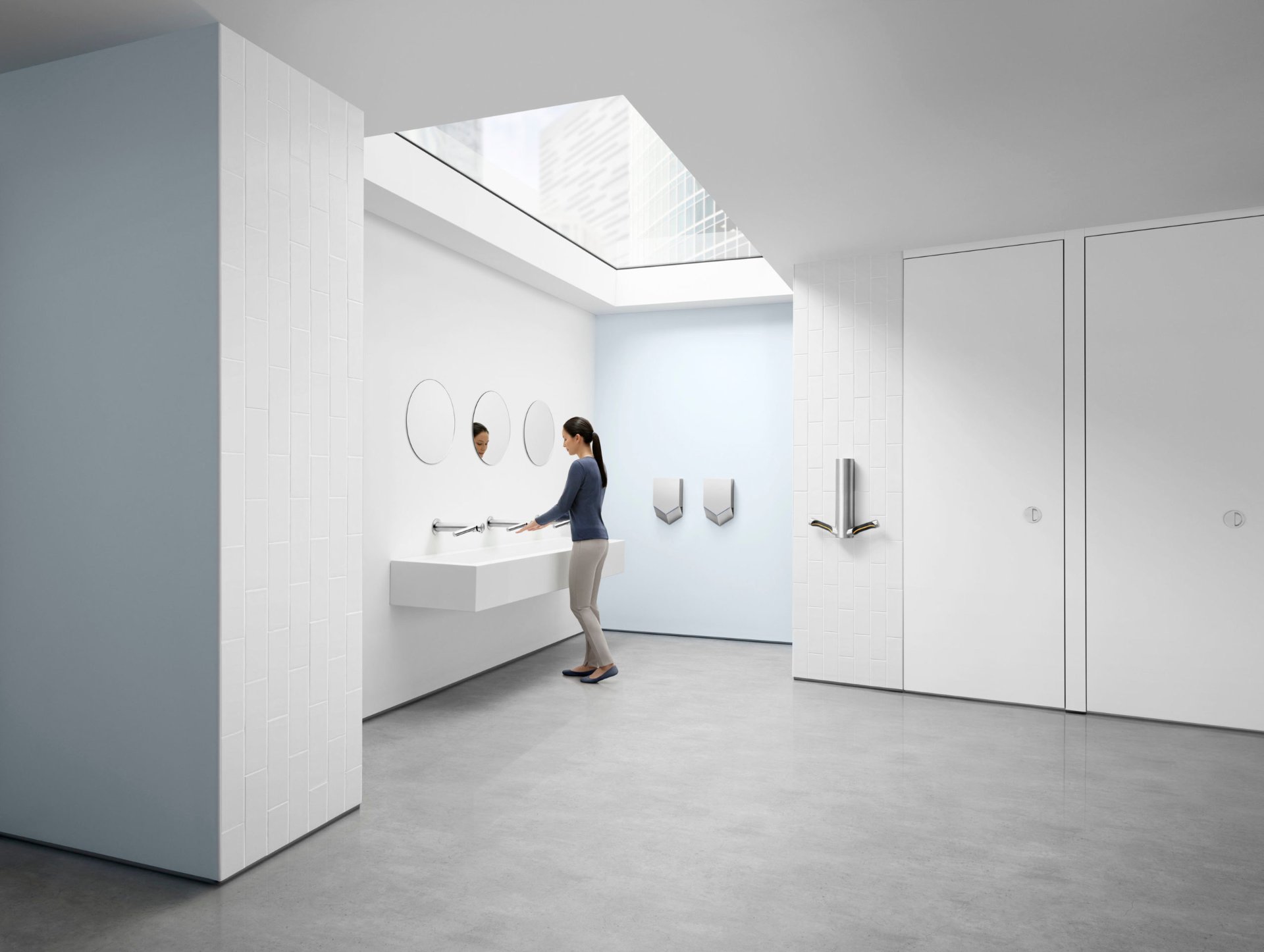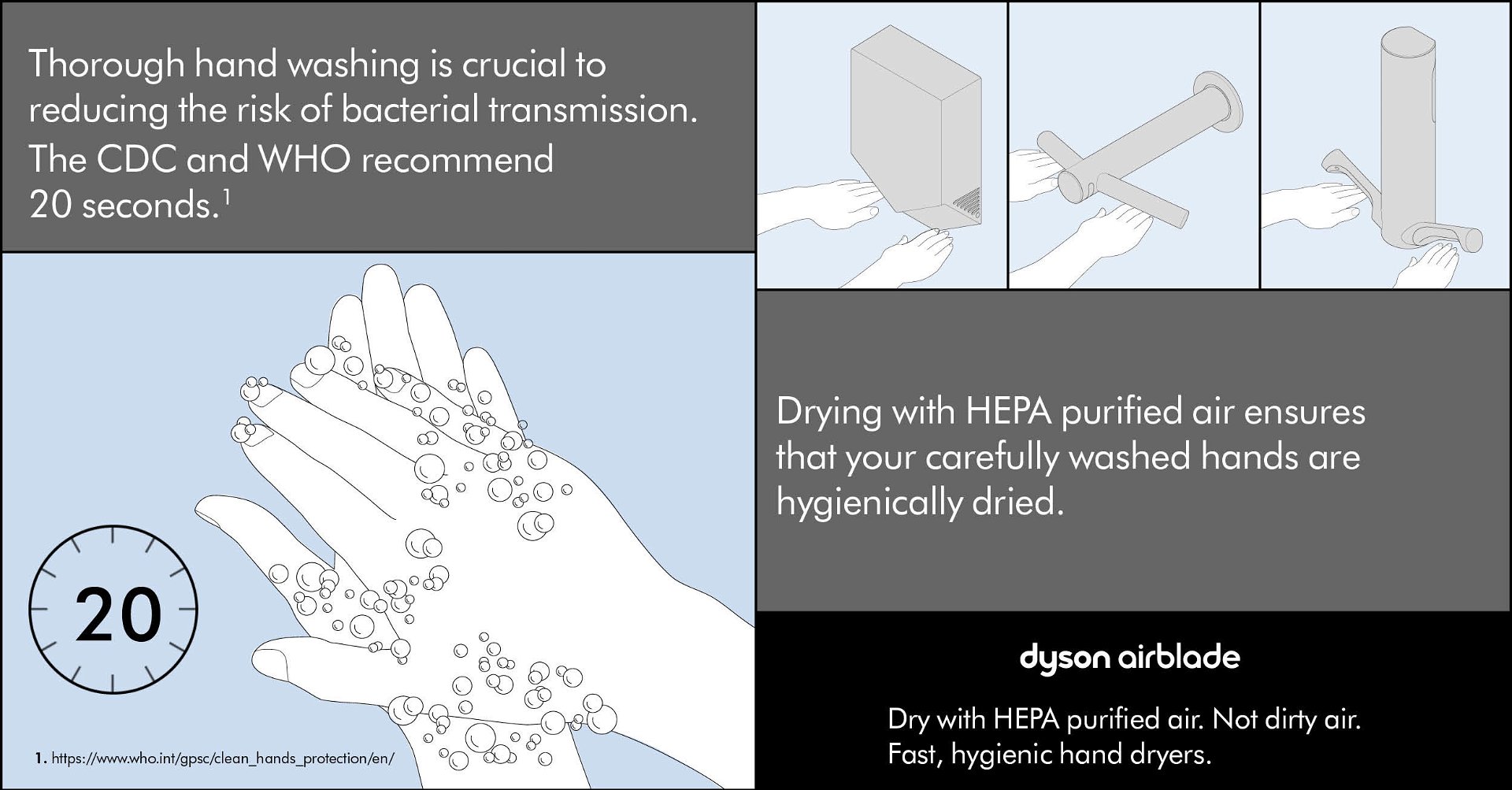Futureproof your office and return to the workplace safely with touch-free Dyson Airblade hand dryer technology

- With many returning to the workplace, Dyson Airblade™ technology can help contribute to a hygienic washroom environment and keep office workers safe, delivering a totally touch free experience, unlike some other conventional hand drying methods.
- Dry hands fast and hygienically with HEPA filtered air – proven to capture 99.95% of particles, including bacteria and viruses from the washroom air that passes through the filter.
- With minimal aerosolisation compared to other activities in the washroom, according to new research, Dyson AirbladeTM hand dryers offer a safe and efficient solution to drying hands quickly at a time when hygiene is of paramount importance.
It is estimated that we spend one third of our adult life at work[1] and in today’s climate it is vital that hygienic hand washing and drying solutions are available in workspaces to help control the spread of germs. All Dyson AirbladeTM hand dryers have HEPA filtration, drying your hands with clean air – not dirty air. They are also touch-free, with our latest hand drying technology the Dyson Airblade 9kJ, engineered with time-of-flight sensors which activate in 0.25 seconds to deliver clean air. This overcomes the problems faced by some paper towel dispensers and button-based hand dryers, and are up to 99% less expensive[2] to run than paper towels with up to 85% less CO2 emissions.
As part of this renewed vigour around hygiene, Dyson commissioned research with an independent laboratory into different drying methods after rinsing hands or properly washing hands and examined the question of aerosolization, which became a topic of discussion at the beginning of the pandemic.
What is the study and what does it mean for workers?
This new research supports that the Dyson AirbladeTM is a safe and hygienic way to dry your hands. In this independent study hands rinsed with water (no soap) or washed with soap for 20 seconds were then dried using Dyson AirbladeTM hand dryers or paper towels. The objective was to determine the effect of the different hand drying methods on concentration of aerosols and bacteria in air. The study results showed that aerosols can be generated in a washroom due to different activities, such as walking, and using a tap. It also revealed that in general drying your hands with a Dyson AirbladeTM hand dryer showed no statistical difference to these common washroom activities, such as walking and washing hands.
It also showed the increase of aerosols and bacteria numbers after drying with any of the Dyson AirbladeTM hand dryer models is comparable to the numbers obtained when hands are dried with paper towels. Dispelling any uncertainty around this technology in the process. Add to that the fact that Dyson Airblade technology is touch free at a time when people are conscious of touching surfaces such as dispensers, door handles or touching buttons. In a global hygiene study[4] in July 2020, Dyson examined how attitudes towards the washroom and general hand hygiene have changed since COVID-19 started. The study revealed that poorly maintained washrooms caused people concern, with 40% worrying about having to press buttons on hand dryers to use them. 58% of those surveyed selected touchless activation of a hand dryer as one of the features that would put their mind at ease if using a hand dryer and a further 47% stated that hand dryers with filters, which clean the air would also make them feel more confident when drying their hands with a hand dryer.
AEROSOLISATION
- Aerosolisation is the emission or creation of liquid or solid particles, or a mix of both that are suspended in air. Depending on the size and other factors they will stay longer in the air or will settle quicker. For example, 10 microns aerosols could take a few minutes to settle while aerosols smaller than 0.3 microns might never settle. The time of settling increases with the decrease of the size of the aerosol.
FUTURE OF HYGIENIC WASHROOMS
- A global hygiene study undertaken by Dyson in July 20 looked at how attitudes towards the washroom and general hand hygiene have changed since COVID-19 started.Comparing to the same time in 2019, there was a portion of people who were more concerned around using hand dryers. 58% selected touchless activation of a hand dryer as one of the features which would put their mind at ease when using a hand dryer, and a further 47% stated that including filters, which clean the air used to dry their hands would also ease their concerns when using a hand dryer.
- For over 15 years Dyson microbiologists have drawn on expertise from a range of sectors, including the food industry, the public health sector and chemical microbiology – to ensure its Dyson Airblade™ technology is safe for real-world use.
- The technology is touch-free, which helps prevent the spread of bacteria and viruses. This important in public or communal spaces, such as office washrooms, department stores, shopping malls or service stations.
- All Dyson Airblade™ hand dryers have HEPA filters as standard. Tests have shown the filters capture 95% / 99.97% of particles as small as 0.1 microns /0.3 microns.
- Dyson Airblade hand dryers are also equipped with powerful Dyson digital motor V4 motors that draws dirty air into the machine, passing the dirty air through the HEPA grade filter and releasing purified
- The latest model, the Dyson Airblade 9kJ hand dryer, is the fastest, most energy efficient HEPA filtered hand dryer and uses ‘time of flight’ sensors to quickly activate air - drying hands in 10 seconds in Max mode, while using less energy and offering an alternative to single-use paper towels.
DYSON AIRBLADE 9KJ™ HAND DRYER:
- The Dyson Airblade 9kJ hand dryer is the fastest most energy efficient HEPA-filtered hand dryer
- Three years in development, more than 700 prototypes
- The Dyson Airblade 9kJ hand dryer produces up to 85% less CO2 than paper towels and costs less than 99% to run in Eco mode.
- More information can be found here: dyson.ae/en-AE/for-business/hand-dryers
ABOUT DYSON
- Having started in a Coach House near Bath, UK, Dyson has consistently grown since it was established in 1993. Today Dyson is a global technology company with engineering, research, development and testing operations in the UK, Malaysia, Singapore, and the Philippines. Dyson has 10,551 patents and patents pending globally.
- Dyson directly employs over 14,000 people globally including 6,000 engineers and scientists. Drawing on its global research and development network, Dyson is realising ambitious plans to develop new technologies with global teams focused solid-state battery cells, high-speed electric motors, vision systems, machine learning technologies, and A.I. Investment. Dyson’s in-house robotics team is one of the largest in the UK. Alongside the growing in-house activity, the Dyson Robotics Lab at Imperial College London continues its long-term research program.
- In 2018, turnover grew 28% to £4.4bn and profits increased by 33% to £1.1bn. Dyson will continue to reinvest profits back into technology development, products and support its owners.
ABOUT THE DYSON PROFESSIONAL CATEGORY
- Dyson Professional aims to bring hygienic Dyson technology to every building in the world. We provide our business owners with machines that solve problems others ignore in environments such as offices, airports and hotels.
- Dyson hand dryers have been cited as effective in multiple research studies carried out by the University of Bradford, UK; Philipps University of Marburg, Germany and Campden BRI, UK for example. The studies show that Dyson Airblade hand dryers are hygienic. We can also confirm that they are safe to install in environments where hygiene is paramount, such as on food premises and hospitals.
[1] World Health Organisation, Occupational Health Global Strategy
[2] The environmental impact of electrical appliances and paper towels was measured by Carbon Trust. The calculations were produced using the software Footprint Expert Pro, based on product use over 5 years and using weighted averages of individual countries of use.
[3] Patrick D, Findon G, and Miller T (1997). Residual moisture determines the level of touch-contact-associated bacterial transfer following hand washing. Epidemiol. Infect. 119: 319-325
[4] Global survey conducted in July 2020 across 14 countries worldwide (UK, DE, ES, FR, IT, NL, US, CA, MX, CN, JP, MY, SG, AU) with 8758 respondents in total, aged 18 years-old or above. Individual percentages vary per country.

